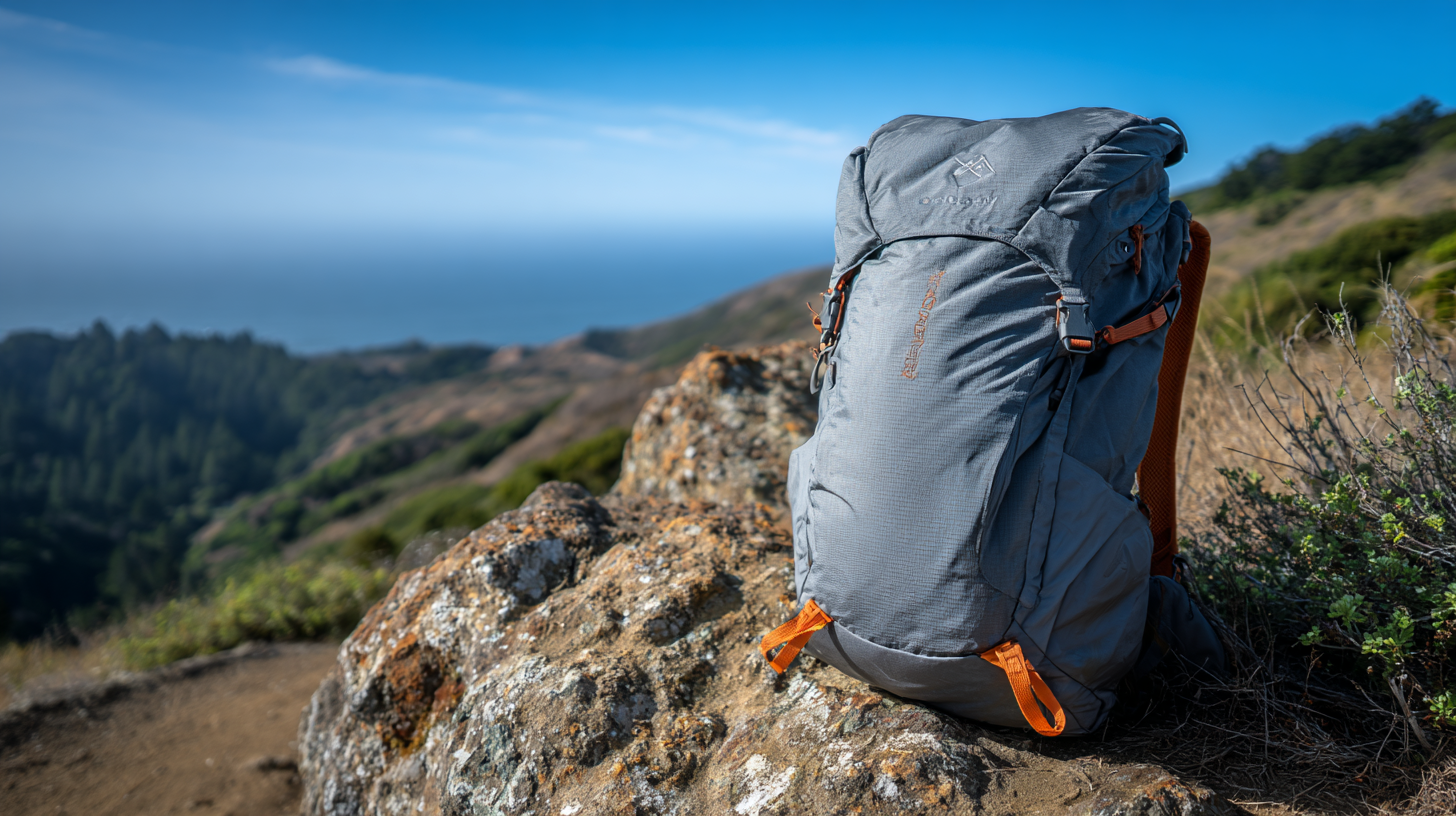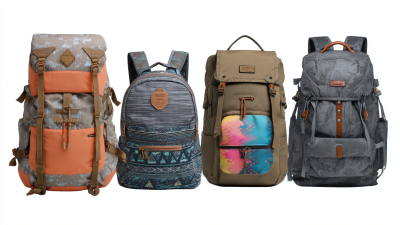Leave Your Message
- E-mail
- Whatsapp
When embarking on outdoor adventures, selecting the right Hiking Day Pack can significantly enhance your experience and comfort. According to the Outdoor Industry Association, over 47 million Americans engaged in hiking activities in 2020 alone, highlighting the growing popularity of outdoor recreation.
 However, choosing an appropriate day pack requires an understanding of various critical features, including size, weight, comfort, and organizational capacity.
Expert insights suggest that a well-fitted day pack not only mitigates fatigue but also contributes to overall safety and enjoyment during hikes.
With a variety of options available on the market, knowing the key attributes of a Hiking Day Pack becomes crucial for optimizing your outdoor excursions.
Whether you are a seasoned hiker or a beginner, this guide will explore essential features and expert recommendations to help you make an informed decision tailored to your adventure needs.
However, choosing an appropriate day pack requires an understanding of various critical features, including size, weight, comfort, and organizational capacity.
Expert insights suggest that a well-fitted day pack not only mitigates fatigue but also contributes to overall safety and enjoyment during hikes.
With a variety of options available on the market, knowing the key attributes of a Hiking Day Pack becomes crucial for optimizing your outdoor excursions.
Whether you are a seasoned hiker or a beginner, this guide will explore essential features and expert recommendations to help you make an informed decision tailored to your adventure needs.
Selecting the right hiking day pack is pivotal for a comfortable and enjoyable outdoor experience. When considering a day pack, first evaluate the size and volume. A pack that is too large may lead to unnecessary weight, while one that is too small may not accommodate essential gear. Most day packs range from 20 to 30 liters, making them suitable for short hikes, but be sure to choose a size that fits your personal gear requirements.
Another critical factor is the fit and adjustability of the pack. Look for adjustable straps and a padded back panel to ensure proper weight distribution and comfort. Features such as hip belts can help stabilize the pack, reducing strain during long treks. Additionally, consider the material of the pack—water-resistant or waterproof options provide better protection against the elements. Lastly, pay attention to pocket organization; having easy access to water bottles, snacks, and gear can greatly enhance your hiking experience.
Selecting a high-quality hiking day pack can significantly enhance your outdoor experience. When looking for the ideal pack, there are several key features to consider. Firstly, the fit and comfort of the pack are paramount. According to a report by the Outdoor Industry Association, around 60% of hikers experience discomfort due to improperly fitted packs, which can lead to longer fatigue and less enjoyment of the hike. Look for adjustable straps, padded shoulder harnesses, and a hip belt that helps distribute weight effectively.
Another important aspect to consider is the material and durability of the pack. High-quality packs are often made from nylon or polyester ripstop fabrics that not only withstand wear and tear but also offer water resistance. A study by Backpacker Magazine revealed that 73% of outdoor enthusiasts prioritize durability in their gear selection. Additionally, features like multiple compartments for organization and hydration compatibility are essential for carrying essentials and keeping hydrated during your adventures. Investing in a well-designed day pack with these key features ensures that you’re well-equipped for any hiking journey.

Selecting the right hiking day pack is crucial for ensuring optimal comfort during your outdoor adventures. When it comes to capacity, experts recommend that a day pack should generally hold between
15 to 30 liters, depending on the duration of your hike and the gear you need. A pack that is too big can cause you to carry unnecessary weight, while one that is too small may not accommodate all your essentials. According to recent testing, the best models in 2025 focus on ergonomic designs that distribute weight evenly, significantly enhancing comfort during extended excursions.
Fit is equally important; an ill-fitting pack can lead to discomfort and fatigue. Look for adjustable straps and an adjustable hip belt to achieve a personalized fit. The ideal hip belt should rest snugly on the hips to transfer weight away from your back, allowing for more fluid movement. Remember to test the pack while wearing the gear you intend to carry. The right size and fit can make all the difference in your overall hiking experience.
Tips: Always try on multiple packs with weight added to gauge comfort before making a purchase. Pay attention to features like ventilation and pockets – these elements can enhance your hiking experience by keeping you organized and cool. Lastly, ensure that your chosen pack includes hydration compatibility, as staying hydrated is paramount during outdoor activities.
When selecting a hiking day pack, understanding the durability of materials is crucial for enduring outdoor adventures. Different fabrics present varying levels of strength, weight, and resistance to the elements. For instance, high denier nylon fabrics have become popular due to their balance of lightweight and rugged durability. According to a 2021 report by the Outdoor Industry Association, packs made with 840D nylon provide an excellent blend of performance and longevity, making them ideal for hikers who encounter varied terrains.
Tip: Always check for water-resistant coatings on your pack. Fabrics such as ripstop nylon with a polyurethane (PU) coating can vastly improve water resistance without adding excessive weight. Additionally, consider reinforced stitching and the presence of abrasion-resistant panels, as these features can significantly enhance a pack's lifespan under harsh conditions.
Another common material is Cordura, which is known for its exceptional durability against wear and tear. In fact, packs utilizing Cordura fabric can outperform regular nylon by up to 10 times in abrasion resistance, making them an excellent choice for aggressive outdoor use. Investing in a day pack with durable materials not only ensures a reliable companion on your hikes but also translates to more enjoyable outdoor experiences.
Tip: Look for warranties that cover material defects; brands that stand behind their fabric choices often have rigorous testing and quality assurance processes in place, validating their commitment to durable outdoor gear.

When selecting a hiking day pack, understanding load distribution and weight management is critical for comfort and performance. Studies indicate that improperly distributed weight can lead to increased fatigue and discomfort. The American Hiking Society emphasizes that a well-designed pack should distribute weight evenly across the back and hips, allowing for better load stability during hikes. This not only enhances your endurance but also reduces the risk of injury.
Experts recommend that the center of gravity for a loaded pack should align with your body's center of gravity when standing upright. A report from the Outdoor Industry Association reveals that heavy loads (over 20% of your body weight) can strain the back and shoulders if not managed properly. A pack with a supportive hip belt can help offload weight from the shoulders, making it easier to carry heavier loads over long distances. Therefore, when choosing a day pack, prioritize features like adjustable straps, padded hip belts, and a thoughtfully designed frame to ensure load distribution is optimized for your personal hiking experience.






